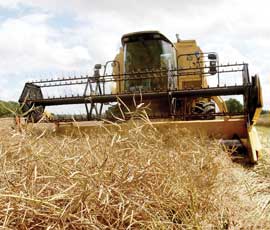Causes revealed of high free fatty acid levels in rapeseed

A new HGCA survey has revealed that the timing of oilseed rape harvest, drying temperature and seed handling can all increase the free fatty acid content of rapeseed oil, thus raising the risk of possible deductions by oilseed crushers.
The survey carried out in partnership with oilseed merchants was prompted by the high free fatty acid levels seen in Scotland last harvest. The contractual maximum is 2%, but some samples were almost 10%.
Free fatty acids are a concern for end users because they can make the oil unsuitable for human consumption and cause foaming in biofuels. Exceeding the 2% level can result in deductions to the price growers receive, reflecting the costs of removing them from the oil.
Following analysis of the survey responses, three key factors were identified: harvest timing, drying conditions and handling.
“Although this was a small, self-selecting survey, it indicates that harvesting too early or too late after desiccation can increase the amount of free fatty acids,” said Simon Oxley, senior research and knowledge transfer manager at HGCA.
“Previous research suggests immature seeds in early harvest and pre-germination of seeds in late harvest increase free fatty acid levels.
“Harvest is a busy period so getting all the crops in at the optimum time can be difficult, especially if there is a poor weather window. If growers do have to bring in their oilseed rape a little early or late they should keep in mind that the FFA content may be affected,” he added.
The survey has also indicated that drying practices influence free fatty acid content, with increased levels recorded when higher drying temperatures were used.
Dr Oxley suggested growers take this into account when selecting temperatures.
“Higher drying temperatures allow greater throughput on drying equipment, but can also increase free fatty acid levels. Growers need to take care when selecting their dryer temperature and balance any risk from an increased free fatty acid content with getting all their crops dry and in stores.”
Ventilation of stored rapeseed prior to drying and uplift is, therefore, something growers may need to consider to keep levels down.
The survey also looked at whether other factors such as variety or region had an effect on levels.
“The work so far hasn’t indicated significant relationships with any other factor,” explains HGCA’s Ellie Marshall, who was responsible for the data analysis, “But we have to bear in mind that this research was conducted in one growing season.”
“In future we intend to expand this work and explore all possible influences on free fatty acid levels in more detail,” says Dr Marshall.
Growers concerned about free fatty acids are urged to speak with their merchant or processor about quality requirements since it is anticipated that a greater level of testing will be carried out in 2013.

